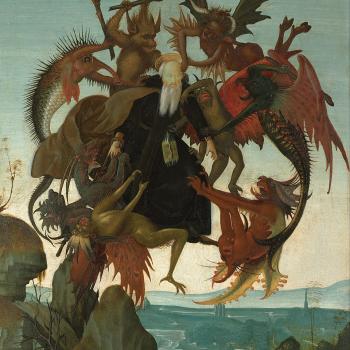
Typically, during daily lives, and the spiritual development we have happen during them, we will not experience many, if any, apparently miraculous events. We should not expect many, if any, profound, and so obviously, other-worldly spiritual encounters. Most of our lives will likely seem mundane. And yet, just because it does not seem as if many great things are occurring in our lives, we do grow and gain greater insight about ourselves, finding out who we really are and what it is we really want. The more we are free from the taint of sin, the more we will find our desires become purified. We will become more and more of who we are instead of under the control of some outside influence, which means, we will not be so easily manipulated or tempted by such influences. Indeed, the more we cast away sin, the more we will find it caused us to think it was what we desired, when in reality, it was not. For sin causes us to become addicted to the pleasures which it brings, giving us only a little of those pleasures before having us find ourselves suffering withdrawal symptoms from not engaging such sin once again. But, the more we turn away from sin, the more we will find ourselves outside of its influence, making the suffering in its wake also vanish. The more, then, we get away from such addiction, the more we shall see who it is we really are, what it is we really desire, and what we desire will be good and pure, as we will find ourselves following after our own internal, natural desire instead of the corrupted desire which came upon us from the influence of sin. Then, when we nurture those desires, we will find that they lead us to the attainment of some greater and greater good, until, at last, we attain God.
We are naturally good; sin has wounded us, causing us to turn aside from our good nature, to follow after and seek after particular goods apart from the holistic good which is to be had with God. We naturally seek after and desire what is good, so that even when we sin, we are following our nature, but it has been warped and confused, as we only discern some lesser goods to embrace. Sin blinds us from knowing the greater good. Thus, when we overcome the desires instilled in us by sin, we find ourselves drawn to God, for God is the source and foundation of every good (and so able to be said the Good itself). This is why it can be said that we naturally seek after and desire God (not, of course, always knowing that it is God which we seek, but when we find what we seek, we will find God and realize it has always been God which we have sought in the midst of the other goods we desired). The problem is not our natural desires, but the ways they have been subverted, creating, as it were, a false conception of who and what we are, and who and what it is we desire through them. That is, when we sin, we begin to believe what we seek is natural to us, causing us, therefore, to form a perverted will which leads us away from the greatest good found in God, and to some lesser good (at least, so long as we are attached to that perverted will).
Abba Poemen expressed his insight into all of this in the way he said our will can act as a wall separating us from God:
Abba Poemen said, ‘The will of man is a brass wall between him and God and a stone of stumbling. When a man renounces it he is also saying to himself, ‘By my God, I can leap over the wall.’ (Ps. 18.29) If a man’s will is in line with what is right, then he can really labour.’ [1]
Naturally, our will is incline to seek after what is good and true, and so, our will, if it is able to proceed naturally, will lead us to labor for, and with, God; but to get there, to return to our natural, pre-sinful condition, we must leap over the pseudo-will which we have developed for ourselves. That is, we must overcome that which seems to be our will but which really is not. It is a habit and inclination seeded into us by sin, a habit which acts as a parasite upon our will, subverting it, while making it seem as if what it directs us to do is truly our will. The more we engage that pseudo-will, the more we reinforce that barrier which we have put up between us and God, making it that much harder for us to get over it. The more, likewise, we let it develop, the more we will be confused as to who we are, and so we will construct a false notion of the self which we will then use to suggest to ourselves and others as to who we think we are, a false self which is then used to explain and justify whatever it is our pseudo-will directs us to do. Sin, therefore, covers us up with defilement after defilement, making it more and more difficult for us and others to know who we truly are, and what our will, if it were not hijacked by sin, would desire. And yet that true self, and our natural will remains. All the pain and sorrow sin and its defilement causes us can be overcome – thanks, of course, to God’s grace, for without that grace, we would not be able to break through all the defilement.
Until we have broken free from the pseudo-will, and the false self it create, Abba Poemen suggested that demonic powers rarely fight against us, because they would have little to no reason to do so as we already do their bidding:
Abraham, the disciple of Abba Agathon, questioned Abba Poemen, saying, ‘How do the demons fight against me?” Abba Poemen said to him, ‘The demons fight against you? They do not fight against us at all as long as we are doing our own will. For our own wills become the demons, and it is these which attack us in order that we may fulfil them. But if you want to see who the demons really fight against, it is against Moses and those who are like him.’[2]
Demonic powers, the powers of darkness, are revealed as shadows in the light; the more we are in the light, the more our true self has been revealed, the more the light will shine in the darkness, revealing what lies in the shadows, causing them to confront us, trying to make us return to our pseudo-will and the false self it established for us. Indeed, it is often that false self, constructed by us and seeded in our mind, which creates these demonic powers, as they are the powers of sin which we have let take control of us and create, as a were, a kind of life for them in our mind. We must confront them with the light and vanquish with the grace found in that light. us. This is not to say there can be and are no other dark powers struggling to control us. What is important is for us not to allow those powers, wherever they come from, to speak, to have a voice and so have a power over our lives. The more we let them speak, the more they will be able to establish themselves and stand against us, halting our spiritual development. And so finally. once we silence them, we can truly return to the ordinary world, and find in it all the good which is in it, and embrace the good for what it is, seeking after it naturally with our will, allowing all that good to direct us properly to the greatest good, the good which is found in and with God.
[1] The Sayings of the Desert Fathers. trans. Benedicta Ward (Kalamazoo, MI: Cistercian Publications, 1984), 174 [Saying of Abba Poemen 54]
[2] The Sayings of the Desert Fathers, 178 [Saying of Abba Poemen 67]
Stay in touch! Like A Little Bit of Nothing on Facebook.
If you liked what you read, please consider sharing it with your friends and family!













